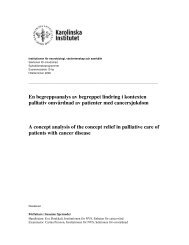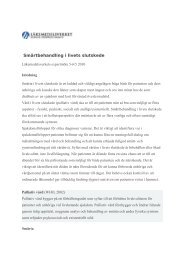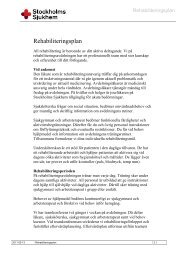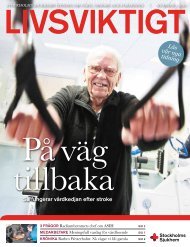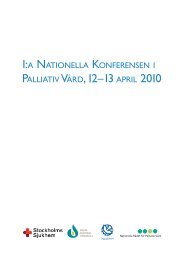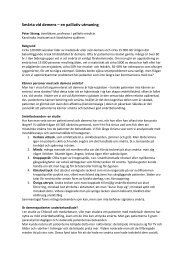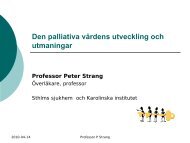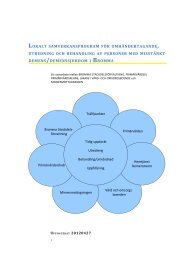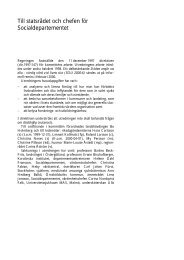Physiotherapy in palliative careâ - Stockholms sjukhem
Physiotherapy in palliative careâ - Stockholms sjukhem
Physiotherapy in palliative careâ - Stockholms sjukhem
You also want an ePaper? Increase the reach of your titles
YUMPU automatically turns print PDFs into web optimized ePapers that Google loves.
When the patient is <strong>in</strong> a late <strong>palliative</strong> phase los<strong>in</strong>g bodily functions is to be expected. Thephysiotherapeutic activities <strong>in</strong> <strong>palliative</strong> care are often about keep<strong>in</strong>g the functions. Goalschange when worsen<strong>in</strong>g occurs. Usual qualitative assessments of physical functions can thenbecome a confirmation of deterioration and will not give the patients feel<strong>in</strong>g of support,security and expectations. (9)Patient Specific Functional Scale (PSFS) is an assessment <strong>in</strong>strument that grades the ability forthe patient to do important activities. It is important that the patient feels <strong>in</strong>volved <strong>in</strong> thephysiotherapeutic activities and that it is positive. For physiotherapy <strong>in</strong> <strong>palliative</strong> care it isimportant to show the patients the resources they still have left.Visual Analog Scale (VAS) Borg-RPE scale or Borg-CR10 scale can be used when you want tomeasure the patient’s feel<strong>in</strong>gs of the symptoms. The <strong>in</strong>tensity can be measured before and afteractivity treatment. For a patient <strong>in</strong> a late <strong>palliative</strong> stage of the disease with difficulty to judgetheir symptoms, the scale can be used verbally or ask questions that can be answered with a yesor no.Base of knowledgeAll care and treatment, <strong>in</strong>clud<strong>in</strong>g the physiotherapeutic, should be built on knowledge andcl<strong>in</strong>ical experience. Physiotherapists today strive to work <strong>in</strong> an evidence based way whichmeans <strong>in</strong>tegrat<strong>in</strong>g cl<strong>in</strong>ical knowledge, the patient’s unique situation and wishes with the bestpossible research evidence.Evidence based care means a systematic and conscious effort to provide care built on the bestavailable scientific evidence. Evidence here means the best available evidence, of effect orvalue of a treatment or other activity. The foundation for evidence based medic<strong>in</strong>e is thesystematic over view of exist<strong>in</strong>g research results. The Swedish Council on Health TechnologyAssessment – SBU has the mandate of the Swedish Government to comprehensively assesshealthcare technology from medical, economic, ethical, and social standpo<strong>in</strong>tsScientific assessment <strong>in</strong> health care aims to identify <strong>in</strong>terventions that offer the greatest benefitsfor patients while utiliz<strong>in</strong>g resources <strong>in</strong> the most efficient way. SBU is currently us<strong>in</strong>g fourlevels to grade evidence.<strong>Physiotherapy</strong> <strong>in</strong> <strong>palliative</strong> care – a cl<strong>in</strong>ical handbook Ulla Frymark, Lilian Hallgren, Ann‐Charlotte Reisberg 11






